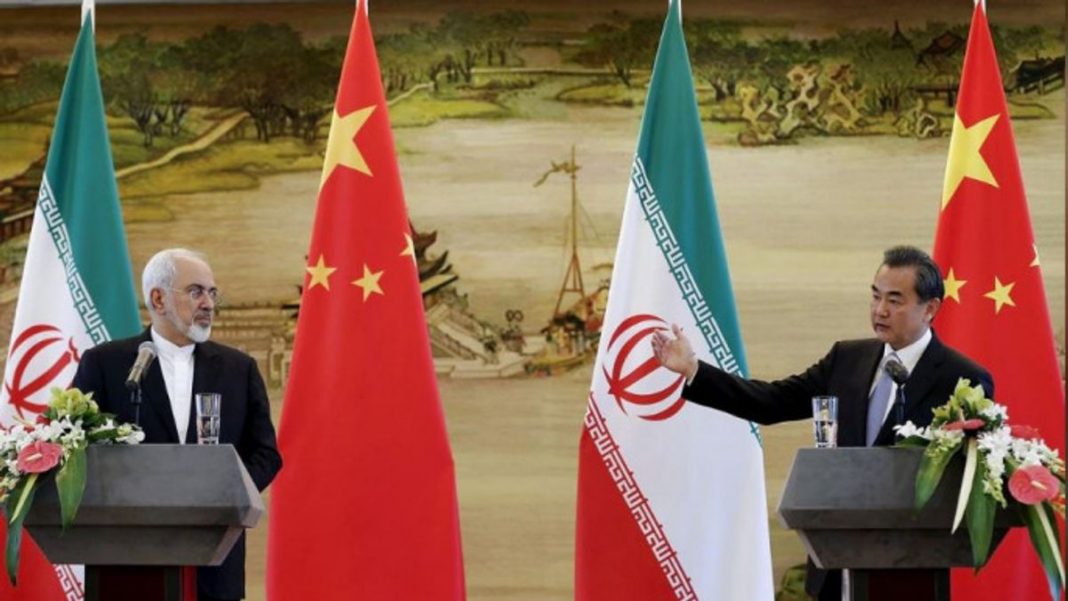Iran has been negotiating a 25-year accord with China and the terms will be announced once a deal is struck, the foreign minister told a stormy session of parliament Sunday.
“With confidence and conviction, we are negotiating a 25-year strategic accord with China,” Iran’s top trading partner, Mohammad Javad Zarif said.
China: US unilateral sanctions affect nuclear accord
During the session, Zarif was heckled by lawmakers, largely over his key role in negotiating a 2015 nuclear deal with world powers, which the US unilaterally abandoned in 2018 as a prelude to reimposing biting sanctions.
The United States has decided to end the sanctions waiver to nuclear projects under the nuclear deal, and pushed for the extension of the UN arms embargo on Iran, which expires in October. This has again undermined joint efforts to preserve the nuclear deal, Zhang told the Security Council.
Read more: Iran turns to China to seek relief from US sanctions
The Iran nuclear deal, officially known as the Joint Comprehensive Plan of Action (JCPOA), is an important multilateral agreement endorsed by Security Council Resolution 2231. It is legally binding and should be effectively implemented, he said.
“We urge the United States to stop its illegal unilateral sanctions and ‘long-arm jurisdiction,’ and return to the right track of observing the JCPOA and Resolution 2231,” he said.
Read more: Did US Attack China & Iran with Coronavirus? – The Most Lethal Way of Fighting
China opposes the U.S. push for extending the UN arms embargo on Iran, said Zhang.
Iran has said the preservation of its nuclear accord with world powers depends on the scheduled end in October of a UN arms embargo as the United States seeks to extend it. Thus the curtailing of the arms ban is inseparable from the nuclear deal, as made clear by Iran on numerous occasions.
Iran’s accord with China: Bright prospects for the future
It was Zarif’s first address to parliament since a new house started work in late May in the wake of elections that were dominated by conservatives and ultra-conservatives.
Zarif insisted there was “nothing secret” about the prospective China deal.
https://twitter.com/korol_koshek/status/1280050544229388289
The nation would be informed “when an accord has been concluded”, he said, adding that the intention had already been made public in January 2016 when President Xi Jinping visited Tehran.
Read more: With US sanctions intact, China emerges as Iran’s lifeline
China is also a key market for Iranian crude exports, which have been severely curtailed by the US sanctions, after its backing out from the nuclear deal with Iran.
The 2015 nuclear deal had given the Islamic republic relief from international sanctions in return for limits on its nuclear programme, but Iranian conservatives staunchly opposed that multilateral agreement, arguing the US could never be trusted.
But Iran’s supreme leader, Ayatollah Ali Khamenei, has come out publicly in support of a strategic bilateral partnership with China.
Iran negotiating 25-year ‘strategic accord’ with China https://t.co/rRK11uQxdA
— The Times of Israel (@TimesofIsrael) July 5, 2020
The planned China deal has been a hot topic on Iranian social media since populist ex-president Mahmud Ahmadinejad last month condemned negotiations underway with a foreign country.
In the last several days, Iranian media have highlighted the possibility that the agreement would see Iran benefit from China’s robust economy and help increase the partnership between the two countries, the Jerusalem Post noted.
The two countries already have warm relations and Beijing may be keen to knit Iran more deeply into its various economic plans at a time when Iran has turned to China and other countries in its struggle against damaging US economic sanctions.
US unilateral sanctions on Iran castigated by International community
Washington is also currently pushing to extend a UN arms embargo on Iran that is set to expire in October. The US already has the support of Saudi Arabia and Israel, but China, Russia, Germany, the UK and France – all members of the UNSC and signatories to the nuclear deal with Iran – have publicly expressed their opposition to the extension plan.
A Chinese envoy asked the United States to stop its illegal unilateral sanctions on Iran, and voiced opposition to a U.S. push for an extension of the UN arms embargo against Iran.
The root cause of the current crisis is the U.S. withdrawal from the Iran nuclear deal in May 2018 and the re-imposition of unilateral sanctions against Iran, said Zhang Jun, China’s permanent representative to the United Nations.
Read more: Iran is dying under US sanctions and China virus
Addressing the council, Russia’s UN Ambassador Vassily Nebenzia described the policy as “a maximum suffocation policy.” An implied reference to the George Floyd incident which took place in US, sparking mass protests around the globe under the slogan of ‘Black lives matter’. Russia’s ambassador deems the policy’s task is to impact a shift in regime change, and to make it impossible for Iran to breathe.
The European Union’s top diplomat said that since the United States has already withdrawn from an international agreement curbing Iran’s nuclear ambitions, it can’t now use its former membership of the pact to try to impose a permanent arms embargo on the Islamic Republic.
GVS News Desk with additional input from AFP and other sources
Will the accord with China help Iran against US pushed sanctions? Share your view with us in the comments bar below.














